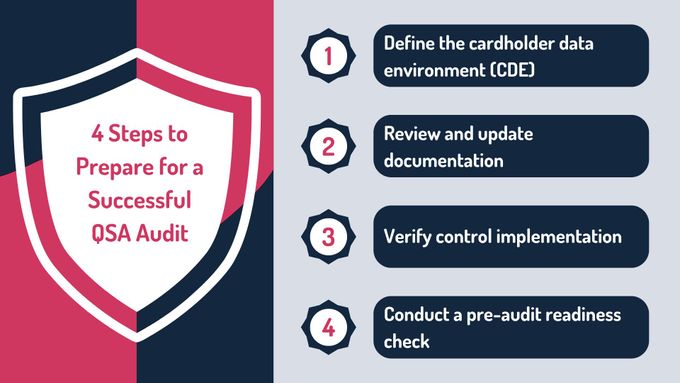What Are QSAs & Why Are They Important for Your Business?
A Qualified Security Assessor (QSA) is a professional certified by the PCI SSC to help organizations achieve PCI DSS compliance. QSAs possess the expertise to assess, validate, and guide businesses toward compliance and certification.
Published April 5, 2025.

With ever-increasing threats like data breaches and fraud, businesses must secure customers' sensitive information, as we're living in a time when digital transactions are dominating the scene. In this regard, the Payment Card Industry Data Security Standard (PCI DSS) was established to protect sensitive payment information from theft and fraud, ensuring a secure environment for processing, storing, and transmitting cardholder data.
A QSA (Qualified Security Assessor) is a vital entity that helps companies reach PCI DSS compliance. Certified by the Payment Card Industry Security Standards Council (PCI SSC), QSAs are specialists who guide companies through the complexities of compliance, perform rigorous audits, and confirm adherence to the standard.
» See how our QSAs can help you reach PCI DSS compliance
What Is a Qualified Security Assessor (QSA)?
A Qualified Security Assessor (QSA) is a professional certified by the Payment Card Industry Security Standards Council (PCI SSC) to help organizations achieve PCI DSS compliance. QSAs possess the expertise to assess, validate, and guide businesses in implementing the strict security measures required to protect cardholder data.
To earn certification, QSAs undergo strict training and must demonstrate a deep understanding of PCI DSS requirements, security technologies, and audit methodologies. They work within Qualified Security Assessor Companies (QSACs) to conduct assessments, ensuring that organizations meet the PCI DSS standards effectively and efficiently.
» Work in FinTech? Here's why PCI DSS is a great baseline
Key Responsibilities
- Conducting a detailed assessment of the organization’s cardholder data environment (CDE) to define the scope of compliance
- Reviewing and validating the implementation of PCI DSS controls, such as encryption, access management, and physical security measures
- Collecting evidence and documentation to verify compliance, including policies, logs, and system configurations
- Preparing the Report on Compliance (ROC) and Attestation of Compliance (AOC), which serve as official records of the organization’s adherence to PCI DSS
Frequency of QSA Audits
Businesses should undergo QSA audits annually to maintain PCI DSS compliance and validate their security measures. However, significant changes to the cardholder data environment (CDE)—such as significant updates to systems, infrastructure, or processes—may require additional reviews to ensure the new elements remain compliant.
Regular audits and timely assessments after changes help organizations address potential risks, maintain alignment with PCI DSS requirements, and ensure their compliance status is up to date.
The Role of QSAs in PCI DSS Audits
One of QSAs' primary responsibilities is producing two critical deliverables that validate an organization’s compliance efforts:
- The Report on Compliance (ROC)
- The Attestation of Compliance (AOC)
Report on Compliance (ROC)
The ROC is a comprehensive document that details the findings of the PCI DSS audit. It includes the scope of the cardholder data environment (CDE), evidence gathered, and an evaluation of each PCI DSS control.
This document provides a thorough overview of the organization’s compliance, outlining areas of strength and any gaps that need remediation. Primarily used by internal teams, acquiring banks, and payment card brands, the ROC serves as a definitive record of the organization's compliance status.
Attestation of Compliance (AOC)
The AOC is a concise summary of the organization's PCI DSS compliance status. Unlike the detailed ROC, the AOC is designed for external stakeholders, such as clients, partners, and acquiring banks, who need assurance of the organization’s adherence to PCI DSS standards.
This document highlights key findings from the audit, confirms compliance, and provides a high-level view of the organization’s security posture.
| Deliverable | Report on Compliance (ROC) | Attestation of Compliance (AOC) |
|---|---|---|
| Purpose | Provides a detailed assessment of the organization’s PCI DSS compliance, including scope, controls, and audit findings. | Summarizes the compliance status in a concise format for external stakeholders. |
| Key Components | Comprehensive report detailing the scope, controls, audit methods, and remediation efforts. | Concise summary confirming compliance and key findings for external stakeholders. |
| Target Audience | Internal teams, PCI SSC, acquiring banks, and payment card brands. | External stakeholders such as clients, partners, and acquiring banks. |
| Detail Level | Comprehensive and highly detailed, typically over 100 pages. | Concise and easy to understand, typically 2-5 pages. |
| Frequency of Use | Used internally and for certification records. | Shared with stakeholders as proof of compliance. |
» Make sure you understand these PCI DSS myths
Why Businesses Need Certified QSAs
QSAs provide businesses with tailored, actionable guidance to meet their unique needs. They assist in defining the scope of the cardholder data environment, implementing effective security controls, and addressing gaps identified during audits.
Benefits of Working With Certified QSAs:
- Streamlined compliance process: Their experience helps organizations define scope, implement controls, and gather evidence efficiently, saving time and resources.
- Risk identification and mitigation: QSAs help identify risks and vulnerabilities in the cardholder data environment (CDE) and recommend tailored solutions to address them.
- Credibility and assurance: Certified QSAs provide trusted, validated compliance deliverables like the ROC and AOC, demonstrating adherence to PCI DSS for stakeholders.
However, it's worth mentioning that working with one consultant and a different auditor during the compliance process can lead to misalignment, as auditors may interpret requirements differently. This can lead to unexpected findings or additional remediation efforts.
Partnering with certified QSAs from a single firm for both consulting and auditing ensures cohesion, minimizes discrepancies, and gives organizations the confidence and clarity needed to achieve and maintain PCI DSS compliance.
» Here's what you should know before hiring a risk assessment provider
Key Factors to Consider When Choosing a QSA Firm
Selecting the right QSA firm is an important step in achieving PCI DSS compliance effectively. To ensure the QSA aligns with your organization’s security and compliance needs, consider these key factors:
- Certification and credentials: Verify that the QSA firm is certified and listed with the Payment Card Industry Security Standards Council (PCI SSC). Only certified QSAs are authorized to conduct official PCI DSS audits and issue deliverables like the ROC and AOC.
- Relevant experience: Choose a QSA firm familiar with your business model, technology stack, and industry-specific challenges. A deep understanding of your processes ensures a smoother compliance journey and tailored recommendations.
- Comprehensive services: Opt for a firm that offers a full suite of services, including readiness assessments, gap analyses, and ongoing compliance support. Working with the same firm for consulting and auditing ensures alignment and consistency, reducing the risk of differing requirements between consultants and auditors.
- Clear deliverables: Ensure the firm provides the essential ROC and AOC deliverables. These documents are critical for demonstrating compliance to stakeholders and should meet both internal and external needs.
Steps to Prepare for a Successful QSA Audit
Unlike ISO 27001 or SOC 2, which allow some flexibility in tailoring controls to fit an organization's context, PCI DSS requires strict adherence to all its requirements. Each control must be fully implemented and operational to achieve compliance, leaving no room for partial compliance or alternative approaches.
1. Define the Cardholder Data Environment (CDE)
Identify all systems, networks, and processes that handle cardholder data, including any third-party services involved in data processing or storage. Also, simplify compliance efforts by reducing the scope through techniques like network segmentation or outsourcing non-critical processes. A well-defined scope ensures the audit focuses only on relevant systems, saving time and effort.
2. Review and Update Documentation
Ensure all required policies, procedures, and evidence are up-to-date, complete, and aligned with PCI DSS requirements. This includes security policies, access control lists, incident response plans, and system configurations. Organized documentation helps QSAs verify compliance quickly and avoids delays during the audit process.
3. Verify Control Implementation
Confirm that all PCI DSS controls, such as encryption, access management, and logging, are correctly implemented and functioning as intended. Regularly test controls and ensure they are operational across all in-scope systems. Effective control implementation reduces the risk of non-compliance findings during the audit.
4. Conduct a Pre-Audit Readiness Check
Perform an internal review or readiness assessment to identify and address any gaps in your compliance posture before the QSA audit begins. This step ensures that all controls are fully operational and that your documentation and evidence are complete. A readiness check minimizes surprises and increases the chances of a successful audit outcome.
» Here's how to build a robust PCI DSS security strategy
Risks of Non-Compliance
Failing to comply with PCI DSS can lead to significant financial, legal, and reputational consequences:
- Fines: Organizations may face hefty fines from payment card brands or acquiring banks, often ranging from thousands to millions of dollars depending on the severity of the violation.
- Liability: In the event of a data breach, affected businesses may be required to compensate victims, cover forensic investigation costs, and handle potential lawsuits.
- Reputational damage: Beyond just financial penalties, the damage to an organization’s reputation can be even more devastating. It can erode customer trust and jeopardize future business relationships. Without PCI DSS, organizations may struggle to secure partnerships with vendors or clients who require compliance as part of their agreements.
- Lost revenue: In some cases, businesses may even lose the ability to process credit card payments, directly affecting revenue streams.
Rebuilding customer trust and brand reputation after a breach or non-compliance event can take years, making proactive compliance not just a regulatory requirement but a critical component of sustained business success.
What Happens When PCI DSS Compliance Fails: An Example
One notable example of PCI DSS non-compliance is the 2013 data breach at Target Corporation.
In this incident, cybercriminals gained unauthorized access to Target's network, compromising the credit and debit card information of approximately 40 million customers. Investigations revealed that Target was not fully compliant with PCI DSS requirements at the time. Specifically, they failed to properly segment their network to isolate sensitive payment card data and did not maintain adequate monitoring systems to detect suspicious activities.
» Don't forget to leverage penetration testing and training in PCI DSS
Reach PCI DSS Compliance With GRSee
GRSee Consulting provides a full-service security solution for PCI DSS compliance, guiding businesses through advisory, gap analysis, audits, and ongoing maintenance. Our high-touch, white-glove approach ensures personalized attention and tailored solutions for every client. By outsourcing your PCI DSS efforts to us, your organization can simplify the process while focusing on core operations.
Beyond the initial audit and certification, we stay actively involved, offering full maintenance of PCI DSS requirements to ensure sustained compliance and adaptability. With hands-on expertise and innovative tools, GRSee Consulting is the trusted partner for achieving and maintaining PCI DSS compliance and certification.
» Ready to begin? Contact us to learn more about our startup and enterprise PCI DSS services





